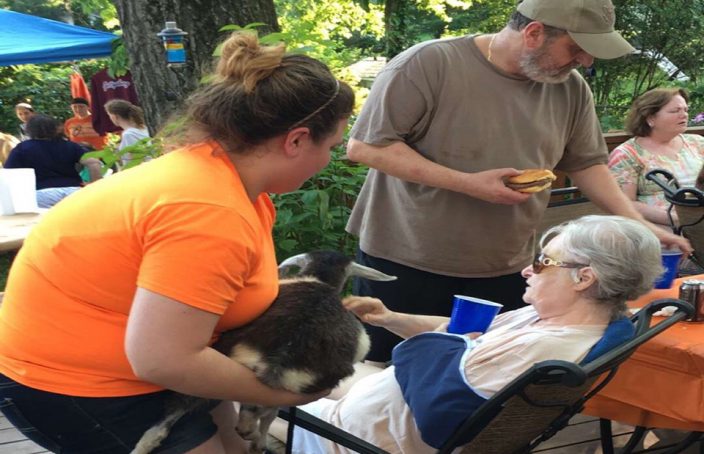LAMY CENTER CAREGIVER CONNECTION: QUIS CURABIT IPSOS CURANTES?*
Written By: Rudi Lamy, MLS, MAS, Consultant to the Peter Lamy Center on Drug Therapy and Aging
In my first posting of this series, I introduced myself as the caregiver to a patient with dementia. While that post was accurate, it did not give you the whole scope of my responsibilities.
I am also a caregiver to a 63-year old retired, overweight, overstressed, and underpaid gentleman with Crohn’s disease, diabetes, arthritis, and a penchant for kidney stones and migraine headaches – in other words, me.
At the end of the first century in the Common Era (CE) or, possibly, the beginning of the second century CE, a Roman poet by the name of Juvenal wrote a series of satires that included the phrase “quis custodiet ipsos custodes?” A proper translation reads “who will guard the guardians themselves?” You may have noticed the similarity with this month’s posting title: Quis Curabit Ipsos Curantes? Or, in English, “Who Will Take Care of the Caretakers Themselves?”*
Care for Yourself, Care for Your Loved One
To whom then is entrusted the care of the caretakers? That responsibility falls to us, the caregivers ourselves. Since the start of my wife’s illness, as I sought help, I’ve heard one seemingly simple piece of advice many, many times: take care of yourself or you cannot take care of them. How true it is that we as caregivers bear the responsibility of caring not just for our patients, but also for ourselves. That responsibility is all the more apparent when a caregiver simply must, but cannot, get their own head off the pillow.
Caregivers can, without question, find a myriad of ways to care for themselves. I, myself, have found methods that work well for me. Other techniques I’ve put on hold, not yet tried, or simply abandoned. Please keep in mind that what works for me may not be suitable for someone else. However, all of these methods are worth exploring. In addition, any tools that I, a friend, or advisor might suggest — even if you should feel uncomfortable with the suggestion — can always be used as guideposts for your own personal search for islands of calm in the vast and unpredictable sea that is your loved one’s illness.
Proper Health Care Is a Must
The simplest and most expedient route for you to take toward peace is, of course, pharmaceuticals. There are wide selections of both antidepressants and anxiolytics from which your physician might prescribe and about which you can consult your pharmacist.
I have been able to cultivate a good working relationship with all of our physicians and pharmacists. If you’ve not done so already, you’ll need to do so to help provide the best possible care for both your charge and yourself. For starters, you can review this brochure from the Peter Lamy Center on Drug Therapy and Aging for tips to help you choose the pharmacy and pharmacist that’s right for you.
I’ve always found it best to use one pharmacy for all prescriptions. Alas, that is not always possible, so I keep one backup for weekend emergencies. Both patient and caregiver should also use the same primary care physician as well as specialists to allow your health care providers the opportunity to treat you and yours as a single unit. Make sure that each physician who should see your medical records gets copies.
Find Opportunities to Relax and Recharge
There are also a number of non-medical routes to find the best caregiver care solutions:
- Walk
- Ride a bicycle
- Join the YMCA
- Eat healthy (I myself have been cutting back on caffeine and sugar lately)
- Get sufficient quality sleep
Take advantage of every opportunity to relax. As you can see in the photo above, my wife and I took this particular piece of advice to heart when we attended a party at our neighbor’s home that included a petting zoo (the staff were kind enough to bring the goat to see my wife as I took advantage of the free food). Take advantage of local government services of all sorts. My wife and I are long-time cardholders and avid users of the local branch of the county public library. Our county also has a Department of Aging that runs 20 senior centers, which provide an array of year-round activities.
Seek Support from Others
I also found that it helped to talk to someone who understood our situation. It’s an option you may wish to explore as well. In my case, part of my wife’s ongoing therapy includes a clinical social worker with whom we, as a couple, meet on a regular basis.
In addition, I became a member of an Alzheimer’s support group. I found that an Alzheimer’s support group, which has the approval of the Alzheimer’s Association, worked best for me. If you’re looking for a support group relevant to your loved one’s illness, I recommend beginning your search with the professional organization(s) known to advocate for that illness, such as the American Cancer Society, American Heart Association, and the American Psychiatric Association – just to name a few. You’ll be surprised by the breadth of information available through these resources. Don’t be discouraged if you don’t find support right away; keep searching and don’t forget to ask your health care providers.
Whether you try one method, or as many as I do, remember that you are working to take care of TWO people. You cannot take care of your loved one if you do not take care of yourself
Thanks for reading,
Rudi Lamy
Caregiver
*Latin phrases and translations were graciously provided by Jay Freyman, PhD, associate professor emeritus in the Department of Ancient Studies at the University of Maryland, Baltimore County (UMBC).

